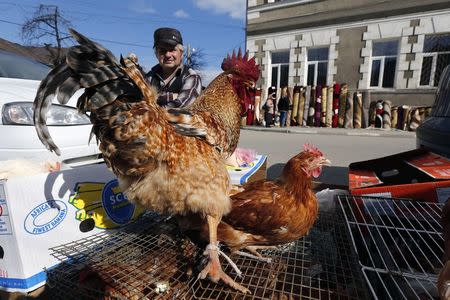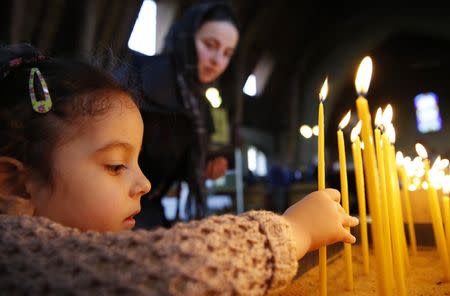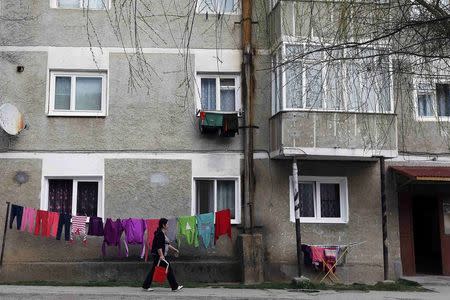Amid rising Euroscepticism, Romanians build new lives in Britain
By Luiza Ilie LONDON/ABRUD Romania (Reuters) - Adriana Berindei ran out of patience with her small Romanian hometown of Abrud when she tried and failed for the 16th time to get tenure at the local school where she taught. So she hung up her two undergraduate degrees and two masters in political science and modern history and moved to Britain to work first as a childminder and then a cleaner. Though she lives with her boyfriend in a crowded house with other migrants and was hesitant to tell her parents she worked as a cleaner, Berindei says life in London has given her peace of mind. She plans to start a small business and dreams of buying a house with her partner. "I was cleaning a sink one day and I thought, if only my mother could see me now," said Berindei, a petite 39-year-old who took to London right away. "Sixteen years of torment was enough for me." Immigration has become a hot topic in Europe as the continent recovers slowly from years of economic hardship. Anti-EU parties are likely to score strongly in elections to the European Union parliament next week, many demanding that borders be shut to new migrants or numbers be strictly rationed. Yet EU rules mean people are free to move from the poorer east to the richer west of the bloc and thousands of people from Africa and Asia continue to risk perilous routes across the Mediterranean. Reuters visited Abrud to better understand what prompted Berindei and millions like her to leave. Like many towns in the Black Sea nation, Abrud was hollowed out by industrial decline and a mass exodus of people after Communism fell in 1989. Roads are pitted, factories and apartment blocks abandoned, poverty is rife. A Romanian teacher typically earns about $450 per month - less than the average wage - compared to the 700 pounds ($1175) Berindei earned when she first arrived as a childminder in Britain, on top of which she was given room and board. By the time she joined the ranks of an estimated 3.5 million Romanians working abroad in 2012, an anti-immigration backlash was underway in countries like Britain, France and Denmark. Fringe parties could win as many as a fifth of all seats in the European parliament next week, making life even more difficult for leaders like Britain's David Cameron. Under pressure from the UK Independence Party (UKIP) and within his own party, he has promised a referendum on EU membership by 2017 if re-elected next year. Britain has tightened access to unemployment benefits and child support subsidies for migrants, and Germany is considering doing the same. "We are seeing what we would call a new normal in public opinion, which is much more sceptical towards the EU and the phenomenon of immigration overall," said Elizabeth Collett, director of Migration Policy Institute Europe in Brussels. Britain was among the last to lift restrictions for Romanian and Bulgarian workers at the start of this year. UKIP has stoked fears that a mass influx of people from the bloc's two poorest countries would take jobs from British workers and burden the welfare system. "Romanian migrants as EU citizens taking advantage of free movement rights are at that tricky crossroads between anti-immigration rhetoric on the one hand and eurosceptic rhetoric on the other hand," Collett said. "They're getting the worst of both worlds in that regard." BUILDERS, NANNIES, CLEANERS Away from the media circus that greeted new Romanian arrivals in Britain early this year, many have built new lives. Those interviewed by Reuters in London and nearby Luton said they faced little discrimination. That may be because while a majority of British people thought immigration a problem, only a fraction of them thought it was a problem in their community, according to a January poll by UK research company Ipsos MORI. Most Romanians in Britain live in London, predominantly in the northwestern borough of Brent, where rooms go for around 100 pounds ($168) per week, many of them shared to bring down costs. Romanian grocery shops are popping up, their windows plastered with job adverts and flyers for childcare services. Community organisers teach Romanian subjects to children and English to their parents while a network of Romanian-run cleaning, construction and catering companies often give work to new arrivals. "I have grown so attached to London, I would like to spend the rest of my life here," said Daniela Badaluta, a 25-year-old fast food restaurant worker, who didn't speak English when she arrived three years ago and now sends several hundred pounds each month to provide for her two children back home. "Maybe it's because London has given me a chance to work, pay rent, take care of my babies and send money home. I couldn't have done any of that in Romania." Romanians can turn for help to web forums and Romanian-language newspapers. Increasingly, Romanians like Berindei and her boyfriend are registering to vote in local elections and some even plan to run for borough council seats. While London has its share of Romanian doctors and finance professionals, most workers have construction, childcare or cleaning jobs. Many, like Berindei, come to the UK with jobs already lined up through recruitment agencies or friends, while others said they get work within weeks. "There is a misunderstanding that Romanians steal jobs from the British," said Marius Spiridon, 37, who arrived last November. "They are distinct job markets, with no overlap. People want to hire Romanians because they are hard workers, are willing to start at the bottom and work for small wages." HOLLOWED OUT The road into Abrud is narrow and pot-holed. Abandoned apartment blocks stand as grey, windowless, empty shells. At a Monday market, people rifle through piles of second-hand clothes at 30 U.S. cents a piece. Abrud has a population of 5,740. A fifth are pensioners. Situated in the middle of what was once a copper and gold mining region, Abrud has lost more than half its population since the 1990s, as the mines closed or cut output. A shrinking population and a brain drain of bright young doctors and engineers are hurting long term economic growth prospects in both Romania and Bulgaria. Most of the residents who have jobs earn about $260 a month, according to Abrud Mayor Nicolae Simina. Romanian migrants have sent home over 30 billion euros since the country joined the EU in 2007, building homes, starting small businesses and paying for their children's education. But many Romanian villages still have gravel roads and lack indoor plumbing or central heating. "People will not invest here because we do not have the infrastructure. We don't have gas, or access to a motorway or railway," said Simina, a former mining engineer. On a narrow, unpaved road near the town's historic centre, Berindei's parents have not changed a thing in her small room. Her father, Ioan, 73, worked for 30 years in the underground tunnels of the state-owned gold mine which shut down in 2006. He now has silicosis, a lung condition often found in miners. He and his wife Maria miss their daughter but support her decision. They send each other food packages through a nephew who is a truck driver. Every Friday she calls her parents, who have been married 49 years. They finish each other's sentences. "Adriana isn't the only one who left. On our street every house has someone working abroad because..." her mother said. "... young people didn't have a choice," her husband added. (Editing by Matthias Williams/Mike Peacock)

 Yahoo News
Yahoo News 


